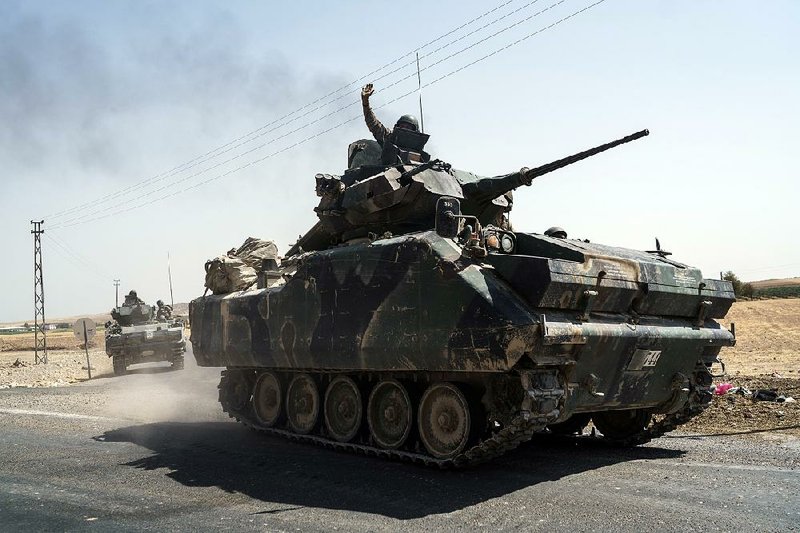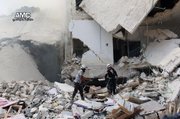BEIRUT -- Backed by Turkish tanks and airstrikes, Syrian rebels clashed with Kurdish-led forces in northeastern Syria in a new escalation that further complicates the already protracted Syrian conflict.
Turkey's military didn't specify what the airstrikes hit, saying only that "terror groups" were targeted south of the village of Jarablus, where the clashes later took place. A Kurdish-affiliated group said its forces were the target and called the attack an "unprecedented and dangerous escalation." If confirmed, they would be the first Turkish airstrikes against Kurdish-allied forces on Syrian soil.
Late Saturday, Turkey's official news agency reported that one Turkish soldier had been killed and three wounded by what it said was a Kurdish rocket attack in Jarablus, near where the fighting has raged. It is the first reported Turkish fatality in the current offensive.
The new escalation highlights concerns that Turkey's incursion into Syria last week could lead to an all-out confrontation between Turkish forces and Syrian Kurds, both American allies, and hinder the war against the Islamic State militant group by diverting resources.
Sherwan Darwish, a spokesman for Kurdish-led forces in the village of Manbij, said Saturday night on Twitter that Kurdish forces were attacked by Turkey-backed militias, impeding the efforts of the Kurds and the international coalition.
The clashes underscore Turkey's determination to push back Kurdish forces from along its borders, and curb their ambitions to form a contiguous entity in northern Syria. Kurdish groups already have declared a semiautonomous administration in Syria and control most of the border area.
Jarablus and Manbij, to the south, liberated from Islamic State fighters by Kurdish-led forces earlier this month, are essential to connecting the western and eastern semiautonomous Kurdish areas in Syria.
Turkish officials said they will continue their offensive in Syria until there is no longer any "terror" threat to Turkey from its war-torn neighbor. Turkey backed Syrian rebels to gain control of Jarablus last week. They are now pushing their way south.
On Saturday, the Syrian rebels said they have seized a number of villages south of Jarablus from Islamic State militants and Kurdish forces. Clashes were fiercest with the Kurdish-allied forces over the village of Amarneh, 5 miles south of Jarablus.
The media office of the Turkish-backed Nour el-din el-Zinki rebel group said the Syrian rebels were supported by Turkish tanks.
A news report on ANHA, the news agency for the semiautonomous Kurdish areas, said the Kurdish forces destroyed a Turkish tank and killed a number of fighters in that attack by the Turkish military and allied groups on Amarneh.
There was no immediate comment from Turkish officials.
The clashes were preceded by Turkish airstrikes against bases of Kurdish-affiliated forces and residential areas at Amarneh. The Jarablus Military Council, affiliated with the U.S.-backed Kurdish-led Syria Democratic Forces, said the Turkish airstrikes marked an "unprecedented and dangerous escalation" that "endangers the future of the region."
The council vowed to stand its ground. Other groups that are part of the Syria Democratic Forces vowed to support those forces, calling on the U.S.-led coalition to explain the Turkish attacks on allied forces.
Turkey's state news agency, citing military sources, said Turkish special forces and coalition airplanes had targeted an ammunition depot and a barracks and outpost used as command centers by "terror groups" south of Jarablus on Saturday morning. The Anadolu Agency did not say which group or village was targeted.
Turkey has long suspected the Syrian Kurdish People's Protection Units of being linked to a Kurdish insurgent group in its own southeast, which it labels as a terror group. It has demanded the People's Protection Units, which make up the bulk of the Syria Democratic Forces and have been one of the most effective U.S. allies in the fight against the Islamic State, withdraw to the east bank of the Euphrates River.
The U.S. supported Turkey's call for the Kurdish forces to move back, and Kurdish officials said they withdrew the People's Protection Units forces from Manbij. But after the Turkish offensive, local forces with Kurdish fighters and backed by People's Protection Units advisers pushed their way north of Manbij, in a rush for control of Jarablus.
aid for Aleppo waiting
The U.N. special envoy to Syria, Staffan de Mistura, appealed to the opposition to approve plans to deliver aid to rebel-held eastern Aleppo and government-held areas of Aleppo through a government-controlled route north of Aleppo during a 48-hour humanitarian pause.
Aleppo has been caught in a bloody circle of violence, with rebels and government forces each promising to unite the divided city. The U.N. said it has pre-positioned aid ready for delivery into Aleppo, to reach 80,000 people on the rebel side and some on the government side. But the opposition, whose fighters have opened another route in the south, were wary of the use of the government-controlled route.
"People are suffering and need assistance. Time is of the essence. All must put the civilian population of Aleppo first and exert their influence now," de Mistura said in a statement, urging approval by today.
But violence rages on. Suspected government helicopters on Saturday dropped two barrel bombs on a wake held for children killed a few days earlier, killing at least 15, according to the Britain-based Syrian Observatory for Human Rights.
The Aleppo Media Center, an activist group in the city, and volunteers on the scene put the death toll higher at 24.
Mohammed Khandakani, a hospital volunteer, said one of the injured told him a barrel bomb was dropped in the Bab al-Nairab neighborhood as people paid their condolences for children killed Thursday in an airstrike that left 11 children dead in the same neighborhood. Minutes later, Khandakani said, another barrel bomb was dropped, injuring an ambulance driver and hampering rescue efforts.
The Syrian government and its Russian ally are the only ones operating helicopters over Aleppo. The government denies it uses barrel bombs.
Elsewhere, Syrian activists said government airplanes attacked a besieged neighborhood in the central city of Homs, including with incendiary bombs that killed two children and left one badly burned.
Hayyan, a Homs resident whose parents remain in the al-Waer neighborhood, said government warplanes launched 18 airstrikes Saturday in the area, the last two of which dropped incendiary bombs. Hayyan, a doctor who runs a volunteer group in the province, refused to be identified further because he was concerned for his family's safety.
The Syrian Observatory for Human Rights said a brother and sister were killed in the airstrikes that left their bodies badly charred. Al-Waer is the last rebel-held area in Homs, Syria's third-largest city. It has been besieged for months with only intermittent international aid deliveries getting through.
Also Saturday, the Syrian government announced it now has full control of the Damascus suburb of Daraya, after the completion of an evacuation deal struck with the government that emptied the area of its remaining rebels and residents and ended a four-year siege and grueling bombing campaign.
The declaration came a day after the evacuation of nearly 5,000 residents and fighters from the suburb began. The deal followed an extensive government campaign of aerial bombing and shelling of Daraya, the last bastion against President Bashar Assad in the western Ghouta region, southwest of Damascus.
Some 700 gunmen and 4,000 civilians were evacuated. The gunmen and their families headed to the northern rebel-controlled Idlib province. Other civilians were escorted to shelters in government-controlled suburbs of Damascus.
Turkish outpost attacked
In Turkey, state-run Anadolu Agency said four soldiers were wounded in the country's southeast in an attack by Kurdish militants.
Militants from the outlawed Kurdistan Workers' Party attacked an army outpost Saturday in Hakkari province's Semdinli district, the news agency reported. It said two of the soldiers are in critical condition and the Turkish military is seeking to capture the militants.
A precarious 2½-year cease-fire between Turkey and the Kurdistan Workers' Party collapsed last summer. Since then, more than 600 Turkish security personnel and thousands of Kurdistan Workers' Party militants have been killed, according to Anadolu. Rights groups say hundreds of civilians also have been killed in the clashes.
Turkey has persisted in its fight against the Islamic State on its own soil.
Macedonian police said Saturday that Turkey has extradited five Macedonians arrested in Istanbul in an operation to crack down on recruitment for the Islamic State group.
Police said the Macedonians, ages 18 to 24, were arrested two weeks ago in Istanbul's Aksaray district along with four other foreigners aiming to fight for the Islamic State in Syria. Two of the arrested Macedonians were seriously injured when they tried to escape during the operation.
Macedonia has sentenced 11 people this year for joining the Islamic State group and recruiting for it.
Nine others, including the five extradited from Turkey, are in custody, awaiting trial.
The Pentagon and U.S. intelligence agencies lately have offered an optimistic assessment of the Islamic State group, suggesting it is a shrinking and increasingly demoralized military force, a shift from the seemingly invincible extremist army that declared an Islamist caliphate two years ago.
The revised assessment came after the relatively swift and bloodless victories this summer near Syria's border with Turkey, including the battle at Jarablus, and in the Sunni heartland of Iraq, two areas where the Islamic State had appeared entrenched.
Current U.S. intelligence estimates say the group now fields as few as 16,000 fighters -- half its army of a year or so ago.
"The number of fighters on the front line has diminished," Lt. Gen. Sean MacFarland, commander of U.S. forces against Islamic State until last week, said in a teleconference from Baghdad. "They've diminished not only in quantity, but also in quality.
"All I know is when we go someplace, it's easier to go there now than it was a year ago. And the enemy doesn't put up as much of a fight."
Information for this article was contributed by Sarah El Deeb, Albert Aji, Dusan Stojanovic and staff members of The Associated Press; and by W.J. Hennigan and Brian Bennett of the Tribune News Service.
A Section on 08/28/2016



